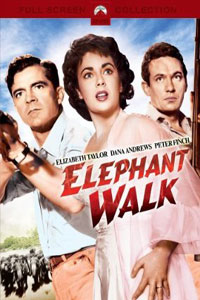
ELEPHANT WALK
US, 1954, 103 Minutes, Colour.
Elizabeth Taylor, Dana Andrews, Peter Finch, Abraham Sofaer.
Directed by William Diertele.
Elephant Walk is one of those enjoyable melodramas that had a big budget and a spectacular tone in the mid-50s. Originally Vivien Leigh was to play the central role but was unable to because of illness. The young Elizabeth Taylor took over the role and made a great success of it. Dana Andrews and Peter Finch at the beginning of his American career are the two men involved. The story is enjoyable melodrama. It has a spectacular climax with the elephants trampling through a mansion. It is popular entertainment.
1. How enjoyable a melodrama was this film? What elements of plot and characterisation make it entertaining? Has the film dated?
2. Was the flashback sequence effective or contrived?
3. What kind of man was John Wiley? His going to England to find a wife? His arrogance? His dedication to his work and the house and property? How insensitive was he to Ruth and her needs in Ceylon? How much under the domination of his father and his father's memory? Did he really love and respect his father?
4. Was Ruth's character well established - as a librarian at Shillingworth-on-Thames? Why did she marry John? Was she prepared for life in Ceylon for isolation and loneliness? How did life in Ceylon change her? How arrogant was she? Did she share John's colonialist attitudes?
5. Ruth's (and the audiences') reaction to the plantation owners and their behaviour. Did John later explain it well? Ruth's reaction to the first party? Her response to Dick Carver?
6. Was Dick Carver developed as a character or was he a stock character? Why did Ruth fall in love with him? Did each react in a responsible way? Was John's reaction good or bad?
7. Why did the servants and the plantation owners remember Tom Wylie so well his tomb, room and portrait, prayers to him? What influence did Wiley have? How well was this shown in the film - especially the confrontation with the elephants? How was Elephant Walk itself an act of arrogance in confronting the elephants and nature? Was the final trampling of the house and property and John's rebellion against his father's memory effective cinema and a thematic vindication for the film?
8. Was the cholera epidemic important for the film? Why?
9. What choices did each of the principal characters make at the end of the film? Were they well made?